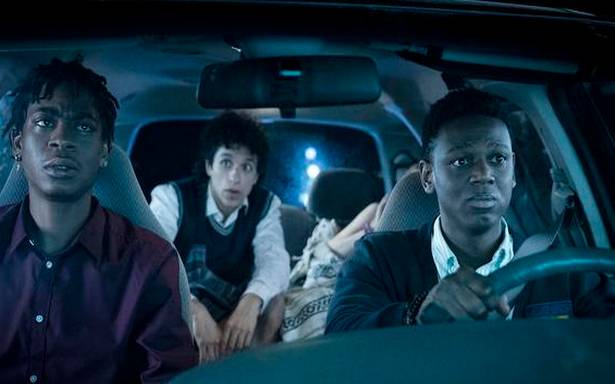Filmmaker Carey Williams’ second feature is kinetic and hilarious, while also being a rare film that gets the personal-is-the-larger-politics right
Imagine two of your friends coming home to find a mysterious drunk girl passed out, reeking of her own retching. What would you suggest they do? The most practical and instinctive reaction is to call 911, right? But what if I tell you your friends are persons of colour and the girl is White? Let me add another layer: what if that girl, in addition to being White, is underage too? Carey Williams’ second feature Emergency is a searing take on racial politics, while in the guise of a harmless buddy-cum-road movie. Smart lines and clever writing make Emergency outrageously funny in very real situations, while at the same time, it never belittles the characters or premise. Some of these jokes, drawn from the characters’ helplessness, work for the very reason that they are not aimed at them, but at the audience.
Kunle (Donald Elise Watkins), Sean (RJ Cyler) and their Latin-American friend Carlos (Sebastian Chacon) are caught in this nightmare, when Carlos, a gamer, forgets to lock their house yet again. While the more practical Kunle suggests they call 911 to help Emma (Maddie Nichols), Sean and Carlos vote against it, given the history of abuses and deaths Black people have faced from the Police Department. Williams airdrops his actors in what could be said as absurd situations making it look like a biting satire on what is real and what is not.
The soft-spoken Kunle and motor-mouthed Sean are determined to make it to their school’s Hall of Fame for completing a crazy party night. A bright student who makes it to Princeton University, Kunle comes from a privileged background; his parents are doctors, while Sean is less privileged and has seen the world for what it is. Their economic backgrounds are established right at the start and help us understand where Kunle and Sean come from, and why they do things the way they do.
In the opening scene, Kunle and Sean listen to a lecture about hate speech wherein the professor repeatedly uses the N-word albeit after issuing a trigger warning. Kunle becomes a silent participant, while Sean goes restless at the mention of the word. They argue over it. For Kunle, the N-word is not a big deal. But Sean highlights what the problem is: “They [White] don’t like telling us what to do, even if the word is disrespectful.”
Emergency is a rare film that gets the personal-is-the-larger-politics right. Though Sean and Kunle are Black and allies, and come under the blanket of oppression, they are still adversaries when it comes to the issue of class. At one point, in fact, after an altercation with Sean, Kunle unabashedly admits that he had a happy childhood and he is sorry that Sean didn’t have one. This class disparity plays out wonderfully in the proceedings, thereby making Emergency a tad more different and important than your regular buddy movies. At the same time, Emergency shouldn’t be misconstrued as a critique on everything White. For, the film targets and speaks to the largely privileged African-American people who are blinded by their privileged upbringing, refusing to understand what the Brotherhood stands for.
In one sense, Emergency could be argued as Kunle’s coming-of-age story; it is essentially about his political awakening, if you consider the ending which may look convenient on the surface, but shows what it is. The police officers track down Kunle and others, and we get sombre music and a slow-motion shot. We will save the details for you. This is when Kunle awakens to what Sean always feared would happen to them. “As Black man, you just have to be at the wrong place at the wrong time,” says Sean in an earlier scene.
In the film’s ‘epilogue’, Kunle looks at the world with a different lens. The fear has already crept in and it is with this fear he looks at the camera, breaking the fourth wall.
Emergency was screened at the ongoing Sundance Film Festival 2022. Watch this space for more coverage.
Source: Read Full Article

